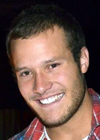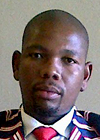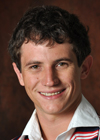Four student leaders on our Bloemfontein and Qwaqwa Campuses each received a scholarship of R15 000. Handré Hay, Estine Cronje, Tsepang Lenka and Jean Vermaas were rewarded for the positive impact they had on the student community in the past three years or more. Student Affairs' scholarship programme acknowledges the contribution of student leaders in the upliftment of the student community.
Read what the four have to say about leadership:
Handré Hay:
 Handré Hay, a third-year BSc Physiotherapy student who holds several leadership positions on our Bloemfontein Campus, served for two consecutive years on the committee of Armentum residence. He was also a member of the executive council in the Students' Representative Council (SRC) and served in two SRC portfolios. "Leadership is about being able to serve. When people see that you are willing to put other people's interests above your own and that you are willing to serve unselfishly, despite a position of authority, you will get far," said Handré.
Handré Hay, a third-year BSc Physiotherapy student who holds several leadership positions on our Bloemfontein Campus, served for two consecutive years on the committee of Armentum residence. He was also a member of the executive council in the Students' Representative Council (SRC) and served in two SRC portfolios. "Leadership is about being able to serve. When people see that you are willing to put other people's interests above your own and that you are willing to serve unselfishly, despite a position of authority, you will get far," said Handré.
Estine Cronje:
 Estine Cronje is the current prime of Marjolein residence. This was the second time the fifth-year Psychology student were re-elected to this position."Leadership is very important to me. One needs leaders in everything you do. I believe a leader should never think herself better than the rest and should work as hard as her team. She should command respect, be disciplined, an example to others, accessible and open to the opinions of other people.
Estine Cronje is the current prime of Marjolein residence. This was the second time the fifth-year Psychology student were re-elected to this position."Leadership is very important to me. One needs leaders in everything you do. I believe a leader should never think herself better than the rest and should work as hard as her team. She should command respect, be disciplined, an example to others, accessible and open to the opinions of other people.
Tsepang Lenka:
 Tsepang Lenka is the SRC President of our Qwaqwa Campus. Tsepang, who was twice elected as prime of his residence, has already obtained his BA degree in Public and Business Management. He is currently working on his Postgraduate Certificate in Education (PGCE). "To me leadership means to serve. As a leader you don't lie to people when things are taking the wrong direction, you stand firm and tell the truth; in that way, people don't lose trust in you. The scholarship inspires me to work even harder," Tsepang said.
Tsepang Lenka is the SRC President of our Qwaqwa Campus. Tsepang, who was twice elected as prime of his residence, has already obtained his BA degree in Public and Business Management. He is currently working on his Postgraduate Certificate in Education (PGCE). "To me leadership means to serve. As a leader you don't lie to people when things are taking the wrong direction, you stand firm and tell the truth; in that way, people don't lose trust in you. The scholarship inspires me to work even harder," Tsepang said.
Jean Vermaas:
 Jean Vermaas is a former SRC member who is currently studying for his LLB degree. Some of Jean's achievements include leadership positions of the Juridical Society and the Broad Students' Transformation Forum. In 2012 he was a founder member of the Student Elders' Council."Leadership is of extreme importance to me. It formed me into the person I am now. Leadership isn't always easy, but in the challenges you face you grow as a leader and as an individual."
Jean Vermaas is a former SRC member who is currently studying for his LLB degree. Some of Jean's achievements include leadership positions of the Juridical Society and the Broad Students' Transformation Forum. In 2012 he was a founder member of the Student Elders' Council."Leadership is of extreme importance to me. It formed me into the person I am now. Leadership isn't always easy, but in the challenges you face you grow as a leader and as an individual."